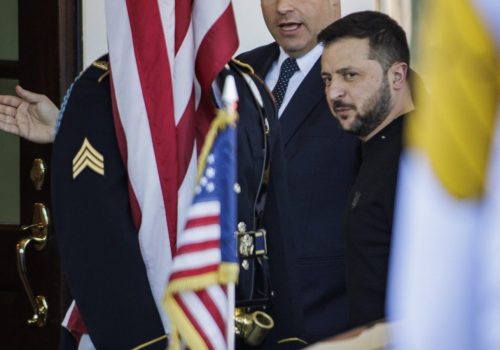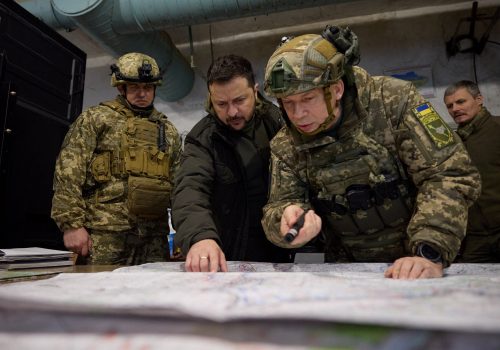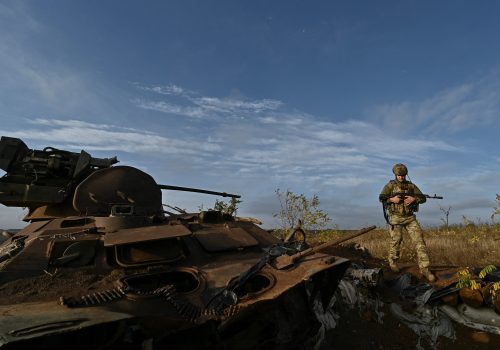Zelenskyy visits the front line that could decide his country’s war
Ukrainian President Volodymyr Zelenskyy made a trip this week to a dangerous and bitterly contested front line in Russia’s war with Ukraine, now into its twenty-second month.
Yes, that would be Washington.
His spirits were high and his mood buoyant when I met with him and a small group of others for a background chat Monday evening at the Ukrainian embassy ahead of his meetings Tuesday with US President Joe Biden, Speaker of the House of Representatives Mike Johnson, and key Senate Republicans.
He talked about the tragedy that would result, both for his military operations and his country’s morale, if the United States did not sustain its support. He talked in detail about what weaponry was lacking, the need to further isolate Russia internationally, Ukraine’s geopolitical benefit for NATO, his country’s underestimated successes in the Black Sea, and why a frozen conflict only serves Moscow.
Biden held out hope that Zelenskyy could deploy his charm and star power to get Republican holdouts to support a supplemental spending bill that includes a long-delayed and urgently needed $50 billion in US security aid for Ukraine. Instead, for the moment, Zelenskyy has gotten stuck in the trenches of Republican demands to include border-security measures as part of the spending package.
Idealists argue that linking these two issues is cynical and underestimates the global and generational consequences of a Ukrainian defeat.
As Max Boot has written, “It’s like saying to President Franklin D. Roosevelt in 1941: We won’t support aid to Britain as it battles the Nazis unless Democrats repeal the Social Security Act or rewrite the labor laws.”
That was then, however, and this is now.
Those Republicans blocking aid to Ukraine might be geopolitically short-sighted, but the Biden administration’s actions also have fallen short of the historic moment.
Fearful of provoking military escalation by Russian President Vladimir Putin, the administration has often provided Ukraine the weapons and defense systems it needed months after they would have been most useful, and not with the ranges or in the quantities required.
All sides will find compromise faster if they first agree that this fight isn’t only about Ukraine, but also about the global future as well as US interests.
As US National Security Advisor Jake Sullivan said on Monday, “I do not think it’s hyperbole to say that basically the security of Europe is at stake, and therefore the risk of American men and women having to go deal with another massive war in Europe, as we have before, if we don’t work with Ukraine to stop Russia in Ukraine.”
What’s unfolding is the most dangerous moment in Europe since the end of World War II colliding with one of the most dysfunctional and divisive moments for US domestic politics in recent memory.
Strike a deal in Congress now, even if it involves border security, or we all will pay later. Should no deal emerge, history will remember Zelenskyy’s visit for all the wrong reasons.
Frederick Kempe is president and chief executive officer of the Atlantic Council. You can follow him on Twitter @FredKempe.
This edition is part of Frederick Kempe’s Inflection Points Today newsletter, a column of quick-hit insights on a world in transition. To receive this newsletter throughout the week, sign up here.
Further reading
Tue, Dec 12, 2023
Zelenskyy visits DC at Ukraine’s most dangerous moment
Fast Thinking By Atlantic Council
Our experts analyze what Zelenskyy got from the visit and what’s next with US support for Ukraine’s war effort.
Fri, Dec 1, 2023
Don’t stop now. US aid to Ukraine continues to be a wise investment.
New Atlanticist By Michael John Williams
Cutting off aid to Ukraine now, as some in Congress propose, would undermine the immediate war effort in Europe and diminish the deterrent power of US military force globally.
Sat, Nov 25, 2023
Expert panel: How will Russia’s invasion of Ukraine develop in 2024?
UkraineAlert By Benton Coblentz
How will Russia’s invasion of Ukraine develop during 2024? The Atlantic Council hosted a panel of experts to explore the key issues that will likely shape Russia’s war in Ukraine during the coming year.
Image: President Joe Biden meets with Ukrainian President Volodymyr Zelenskyy at the White House on Tuesday, Dec. 12, 2023. Photo via Josh Morgan-USA TODAY.


